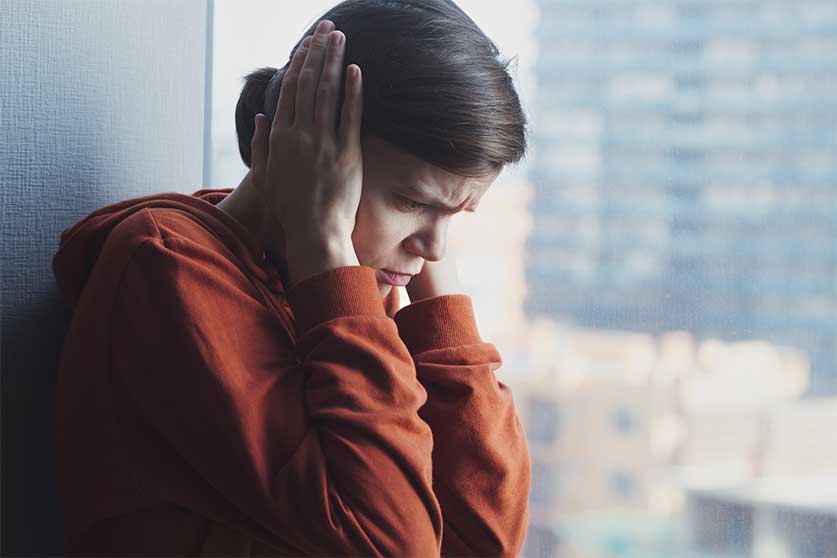Schizophrenia & Alcohol Addiction | Symptoms, Risks, & Treatment

Medically Reviewed By: Manish Mishra, MBBS
Schizophrenia is a treatable brain disorder that involves symptoms of psychosis and disconnection between a person and the world around them. Those with schizophrenia frequently rely on alcohol, potentially leading to an alcohol use disorder (AUD) that can increase and complicate symptoms.

In most cases, situational alcohol abuse does not develop into a full-fledged alcohol use disorder/alcohol addiction.
However, when a person starts abusing alcohol as a form of self-medication, drinking heavily and chronically to escape or cope with feelings of distress, the risk that they will develop a serious drinking problem.
This is often the case with alcohol use disorder (AUD) and schizophrenia, a chronic but treatable psychiatric disorder involving chronic psychosis, or a disconnection between a person and the reality around them.
Left untreated, this combination of behavioral and mental health disorders can have even worse negative effects on a person’s overall mental and physical health than either condition alone.
Symptoms Of Alcohol Use Disorder
Ethanol, or drinking alcohol, is a central nervous system depressant that, if consumed chronically, can produce alcohol dependence and harmful patterns of alcohol abuse and reliance.
Some of the most common signs and symptoms of alcohol use disorder (AUD) include:
- failing to limit the amount of alcohol you drink in specific situations
- struggling to stop drinking even if you want to
- spending lots of time drinking, getting alcohol, or recovering from alcohol
- feeling strong cravings or urges to drink alcohol if you haven’t had it lately
- having problems at work, in school, or at home because of alcohol
- continuing to drink even though alcohol causes you health problems or other issues ranging from frequent hangovers to alcohol-related psychosis
- using alcohol in risky, unsafe, irresponsible situations (while driving, around children, etc.)
- building up a high tolerance to alcohol over time
- suffering alcohol withdrawal symptoms when you stop drinking for a period of time
Symptoms Of Schizophrenia
Schizophrenia, in contrast to AUD, is a chronic mental illness that develops between the ages of 16 and 30. It is characterized by unpredictable periods of psychosis where a person becomes disconnected from the reality of the world around them in favor of their own false perceptions or beliefs.
Schizophrenia is diagnosed based on the criteria included in the Diagnostic and Statistical Manual of Mental Disorders, Fifth Edition (DSM-5), which primarily considers a person’s symptoms, either reported by themselves or by close friends and family members.
Schizophrenia symptoms generally include:
- hallucinations: perceiving things that are not there
- delusions: having strange or irrational beliefs that are not true
- paranoia: feeling that one is being followed, watched, or harmed by others
- negative symptoms: difficulty feeling or showing positive emotions
- disorganized thinking and speech
- a lack of interest in normal daily activities
- avoiding spending time with others, including loved ones
Risks Factors For Co-Occurring AUD & Schizophrenia
Schizophrenia and substance use disorders are mutually related as risk factors and comorbidities.
In other words, those who abuse alcohol or other drugs of abuse from an early age are more likely to develop schizophrenia, and those who develop schizophrenia are also much more likely than the general population to engage in high-risk alcohol misuse and develop a substance use disorder.
Alcohol can also increase the likelihood and severity of a person’s psychotic symptoms.
Heavy abuse of alcohol and/or alcohol withdrawal are sometimes linked to a condition known as alcohol-induced psychosis or alcohol hallucinosis, which those with schizophrenia may be at a particularly high risk for.
Dual Diagnosis Treatment For Schizophrenia & AUD
Dual diagnosis treatment is the best possible treatment option for those facing both schizophrenia and alcohol use disorder.
In a dual diagnosis program, a trained healthcare professional develops a personalized treatment plan to address both of these co-occurring disorders together.
The goal of this type of dual diagnosis care is managing one’s schizophrenia symptoms, discontinuing harmful alcohol consumption, and improving one’s overall wellness and stability.
This can involve treatment interventions such as:
Psychotherapy/Behavioral Therapy
Cognitive behavioral therapy (CBT), and other forms of psychotherapy are proven therapeutic options for addressing both schizophrenia and AUD, particularly in an inpatient setting.
Psychotherapy can help participants change their own harmful thought patterns and behaviors while building up healthier mental resources and coping mechanisms.
Medication
Along with antidepressants, anti-anxiety medications, and other supportive pharmaceuticals, antipsychotic medications play a central role in the treatment of schizophrenia and can prevent or help to manage a person’s psychotic symptoms if used consistently.
Other medications including naloxone, acamprosate, and disulfiram are available to support the recoveries of those experiencing AUD as well.
Peer Support
No one understands what mental and behavioral health disorders feel like better than those who have gone through them before, or who are going through them now.
Peer support groups for both schizophrenia and AUD are available in many areas and online and can be a true lifeline and place of belonging for those in similar situations.
Find Treatment In Ohio
Our mental health and addiction treatment professionals are proud to provide Ohio with leading dual diagnosis treatment services, including:
- medical detox services
- residential substance abuse treatment
- residential mental health treatment
- behavioral therapy
- medication-assisted treatment
- case management
- aftercare support
Learn more about how we can help by contacting us today.
- Centers for Disease Control and Prevention (CDC) https://www.cdc.gov/alcohol/fact-sheets/alcohol-use.htm
- National Institute of Mental Health (NIMH) https://www.nimh.nih.gov/health/topics/schizophrenia
- Alcohol Research & Health https://www.ncbi.nlm.nih.gov/pmc/articles/PMC6683824/

